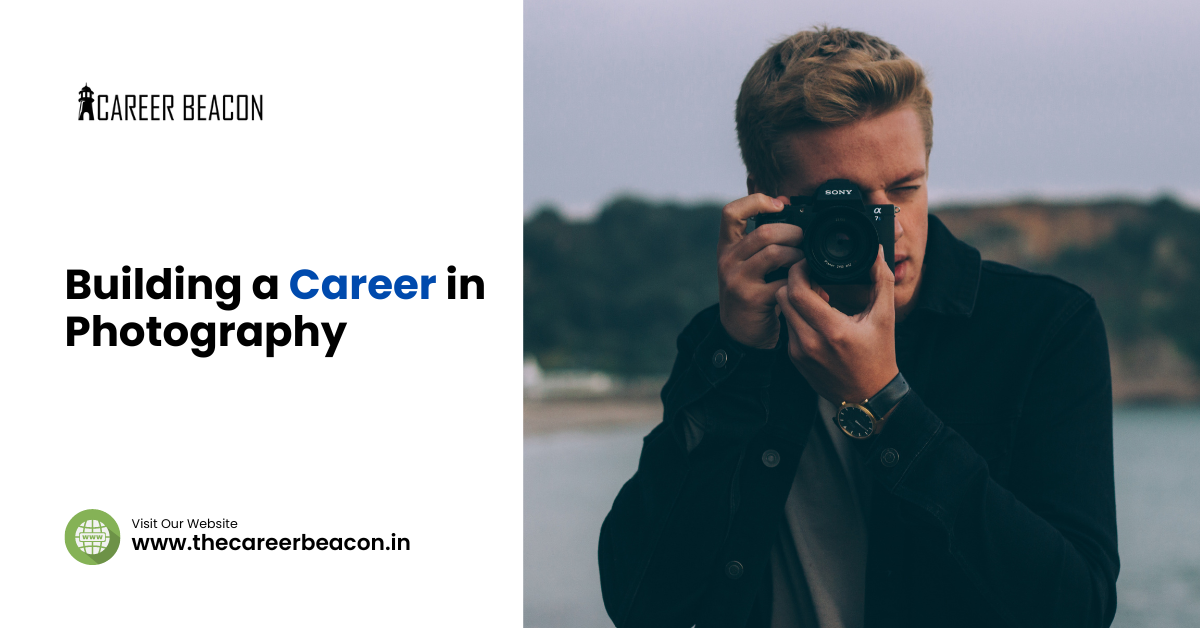
Building a Career in Photography
Photography has become a ubiquitous art form, with everyone from casual phone snappers to seasoned professionals capturing the world around them.
But for those with a burning passion and a keen eye, photography can be more than just a hobby – it can be a rewarding and fulfilling career.
This blog is for aspiring photographers who want to turn their passion into a profession. We’ll delve into the essential skills needed to succeed, explore the diverse career paths available, and provide resources for pursuing professional photography education.
The Art & Science of Photography
Photography, at its core, is the art of capturing light and transforming it into a visual story. The successful photographer has to have a strong combination of artistic vision and technological skills.
- Creative Vision: One can say that a photographer has a very good eye for style, lighting, and detail. The power of story telling using actual pictures is an excellent way of showing the world that can be, the intent of the artist depicted in detail the photos.
- Technical Skills: One cannot hope to become a professional photographer without first mastering the functions of the camera and the principles of light. This involves the knowledge of the proper exposure settings like aperture, shutter speed, and ISO as well as exposure settings.
- Patience and Persistence: Taking great shots often necessitates patience in the process and being open to trying different things. The ‘stick-to-it-tiveness’ is the most important thing if you want to push your photography and creativity even further.
- Concentration: When the shot is framed and the settings are correct, focus and a sharp eye for details are the two things that will make the image appear to be at the top of its quality list.
- Networking: It’s crucial to get engaged with other photographers, trendsetters, and potential clients as part of the enterprise’s growth.
Formal Education: Is it Necessary?
Even though no formal education is needed, a professional photography course can add so many benefits like:
- Structured Learning: The course will have a plan that includes all the technical parts, the theoretical aspects, and the application in practice on the trip and the whole trip in general.
- Development of Skills: The teacher will give you feedback, he will tell you what he finds difficult or new, and he will put you to work on different techniques.
- Networking Opportunities: You will be able not only to mingle with likeminded individuals but also have the chance to join some of the other photographers and out of which you may get some potential clients.
- Portfolio Building: Classes often sponsor photo sessions to let students participate and this is instrumental in gaining a good portfolio for the students.
Types of Photography Courses
- Diploma Courses: This type of training consists of twelve-month training to set the stage of a photo enthusiast that covers all the basics including the camera, light, etc.
- Degree Courses: A Bachelor’s Degree in Arts (B.A) Photography program is upheld by courses in other disciplines such as art history, theory and craft courses but in addition to a wide variety of big subjects including B.F.A and in the liberal arts, instructors instruct about art.
- Master’s Degrees: Master of Fine Art programs serve as advanced lessons in practical skills, as well as research into the concept of art with artistic exploration.
Here are some respected Indian institutions that offer photography courses that are known
- Asian Academy of Film and Television (AAFT), Delhi: https://aaft.com
- Film and Television Institute of India (FTII), Pune: https://www.fti.ac.in
- National Institute of Design (NID), Ahmedabad: https://www.nid.edu/home
- JamiaMiliaIslamia, Delhi: https://jmi.ac.in
Entrance Exams
Some photography programs have entrance exams that reflect the evaluation of your creative potential, technical knowledge, and basic understanding of photography.
Choosing a Specialization
The unique character of the photography profession provides wide options available. There is the possibility to focus and develop a niche that it is correlated to your affections and skills.
A few of the most common ones would be:
- Fashion Photography: Provides the targeted market with the most recent and best ways of dressing well by bringing them images on magazines, in advertisements, and even on websites.
- Business &Industrial Photography: This field is divided into two event photography and program photography, with both concentrating on blue-chip companies, events, and the products showcased at these venues.
- Wildlife Photography: You will have to wait for the animals, gain the knowledge of how animals act, and also own equipment only for this function to capture the superstar of the earth.
- Sports Photography: This form of photography is used to seize action and feelings, and it needs the photographer.
Building Your Career
The career you will take depends on your goals and your interest.
- Freelancing: It allows you to be your own boss and pick projects that attract you. This implies the skills of advertising, and searching for customers and a great work habit.
- Staff Photographer: Work for companies, studios, or publications on a monthly salary and benefits. It’s the route to stability and routine for performers.
- Assistant Photographer: Lots of new photographers start by helping senior photographers, getting work under them and gaining knowledge from seasoned professionals in the industry.
Conclusion
A photography career can be a very fulfilling and fun thing to do. By the way, it is important to perfect your skills.


